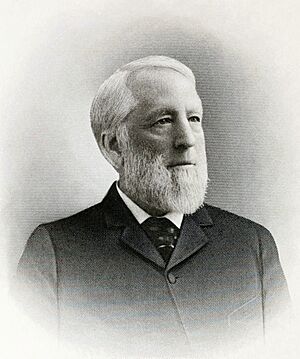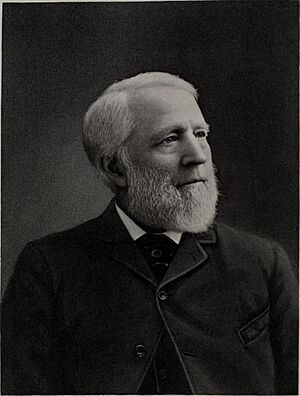Ellis H. Roberts facts for kids
Quick facts for kids
Ellis H. Roberts
|
|
|---|---|
 |
|
| 20th Treasurer of the United States | |
| In office July 1, 1897 – June 30, 1905 |
|
| President | William McKinley Theodore Roosevelt |
| Preceded by | D.N. Morgan |
| Succeeded by | Charles H. Treat |
| Member of the U.S. House of Representatives from New York |
|
| In office March 4, 1871 – March 3, 1875 |
|
| Preceded by | Alexander H. Bailey |
| Succeeded by | George A. Bagley |
| Constituency | 21st district (1871–73) 22nd district (1873–75) |
| Member of the New York State Assembly from the Oneida County, 2nd district |
|
| In office January 1, 1867 – December 31, 1867 |
|
| Preceded by | Alva Penny |
| Succeeded by | Alanson B. Cady |
| Personal details | |
| Born | September 30, 1827 Utica, New York, U.S. |
| Died | January 8, 1918 (aged 90) Utica, New York, U.S. |
| Resting place | Forest Hill Cemetery Utica, New York, U.S. |
| Political party | Republican |
| Signature | |
Ellis Henry Roberts (born September 30, 1827 – died January 8, 1918) was an important American politician. He served as a Representative for New York. He was also the 20th Treasurer of the United States.
Contents
Early Life and Education
Ellis H. Roberts was born in Utica, Oneida County, New York, on September 30, 1827. He went to local schools and the Whitestown Seminary. In 1850, he graduated from Yale College. While at Yale, he was part of two special groups: Alpha Delta Phi and Skull and Bones.
After college, Roberts worked as a principal at Utica Free Academy for a year. From 1851 to 1889, he was the editor and owner of the Utica Morning Herald newspaper.
Political Career
Roberts was very active in politics. He attended the Republican National Conventions in 1864, 1868, and 1876. These conventions are big meetings where the Republican Party chooses its candidates. In 1867, he became a member of the New York State Assembly, which is like the state's law-making body.
As a Republican, Roberts was elected to the U.S. House of Representatives. He served two terms, from March 4, 1871, to March 3, 1875. After his time in Congress, he went back to working with newspapers in Utica.
Later, Roberts held several other important roles:
- He was the Assistant Treasurer of the United States from 1889 to 1893. This job involved helping manage the country's money.
- He became the president of the Franklin National Bank in New York City from 1893 to 1897.
- On July 1, 1897, he was appointed Treasurer of the United States. This is a very important job, overseeing the government's money. He held this position until June 30, 1905, when he decided to leave.
After leaving his role as Treasurer, Roberts continued to work in banking. He passed away in Utica, New York, on January 8, 1918. He was buried in Forest Hill Cemetery in Utica.
Roberts' Ideas on the Economy
Ellis H. Roberts had strong beliefs about how the American economy should work. He supported a policy called protectionism. This means favoring businesses and jobs within the country over foreign trade.
Supporting American Industries
Roberts believed that a country's production grows when it protects its own industries. He thought that when the government lowered taxes on imported goods (which is like free trade), American businesses struggled. But when the government supported local industries, they did much better.
He saw the "home market" (meaning people buying goods made in their own country) as super important. Roberts felt that if the U.S. focused too much on foreign trade, it would hurt its own businesses and even put the country's independence at risk. He thought the government should always help American producers first.
Roberts believed that the best thing a country could do for its people was to encourage many different kinds of jobs and industries. He said that if a country only focused on trade without building up its own production, it was making a big mistake.
Growth and Diversity
Roberts also thought that instead of making less, the U.S. should create more factories and a wider variety of jobs. He noticed that poverty went down as the number of different industries grew. He believed that new industries helped everyone, especially the poor, by creating more jobs and increasing what the country could make.
He imagined a bright future for the United States if it kept encouraging many different types of jobs. He felt it would be wrong for the government to limit American production or focus on foreign trade instead of helping its own markets.
Hamilton's Influence
Roberts agreed with the ideas of Alexander Hamilton, one of America's Founding Fathers. Hamilton believed that relying too much on foreign trade, especially by only selling farm goods, was a mistake. He thought America's best market for its farm products was right here in America.
Hamilton also felt that the government had a right to help new industries, farming, and trade grow. He saw taxes on imported goods as a smart way to help American factories. He also thought that inventors should be rewarded for their new ideas. These actions, Hamilton believed, would create a strong market for American farm goods right at home.
American vs. British Trade
Roberts did not want the United States to copy the British way of doing business. England relied heavily on foreign trade because its factories needed to sell goods to other countries. But Roberts saw that the U.S. economy was strong because Americans bought goods made in their own country. The American home market was becoming famous around the world.
Roberts said that the U.S. only wanted trade that it won fairly. He believed America should not use its navy to force other countries to buy its products. He also said that America had always refused to use its diplomacy to push foreign trade, unless other countries truly welcomed it. Roberts pointed out that throughout history, trade had often led to violence and greed, with wars fought to take wealth and force products on unwilling people. He was proud that the U.S. was choosing a different, more peaceful path for its trade.
 | Dorothy Vaughan |
 | Charles Henry Turner |
 | Hildrus Poindexter |
 | Henry Cecil McBay |


